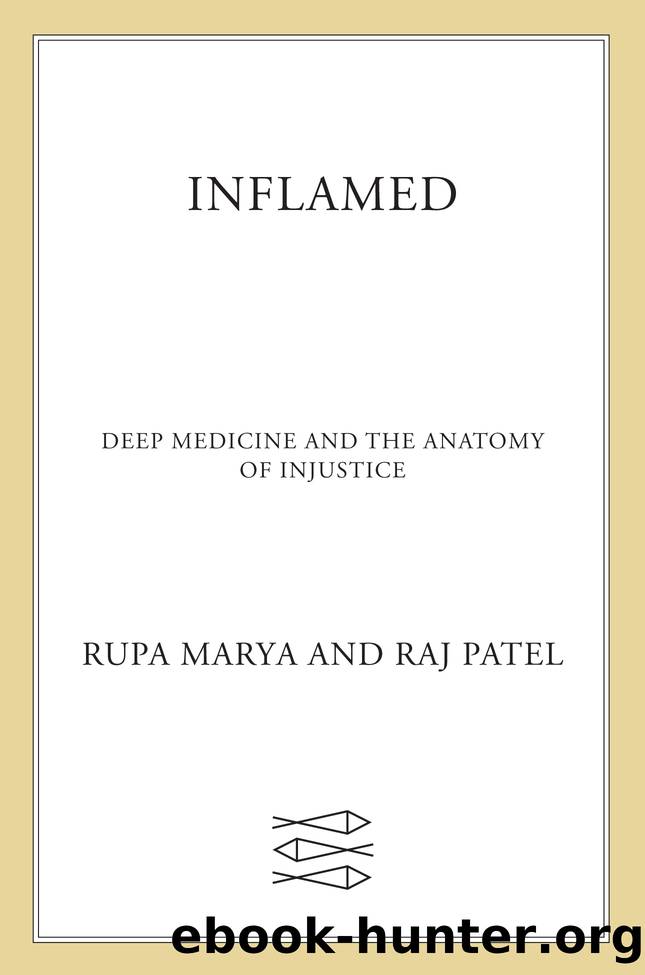Inflamed by Rupa Marya

Author:Rupa Marya
Language: eng
Format: epub
Publisher: Farrar, Straus and Giroux
THE OPPOSITE OF STRESS
Something as seemingly trivial as having a plant in a hospital room reduces pain, anxiety, fatigue, and blood pressure in patients compared to those in rooms without them. Itâs not surprising. One study found that remission from depression was significantly higher among those who walked in nature (61 percent) than among those who were treated in a hospital (21 percent) or left untreated (5 percent).129 The sprawling literature on forest bathing points to an urban route for deep medicine: the web of life is already in cities, even if its attenuated compared to rural areas.130
Central to the story of how human well-being is regulated in nature is the chemical language of hormones. Even though weâre at the early stages of understanding the human-web-of-life boundary, we are a little further along in understanding how human bodies create hormones that react to being in harmony with their surroundings and in relationships. One such hormone is oxytocin, made by the hypothalamus, which plays a role in reproduction of all vertebrates. It is also made by the uterus, the testes, and the heart. This important hormone is responsible for the smooth-muscle contractions of the uterus that push a baby out into the world and for the contractions of lactiferous ducts that bring milk to an infantâs mouth. It also plays a central role in spontaneous erections and ejaculation.131
Oxytocin is essential to social cooperation and empathy and to modulating the impact of stress.132 Called âthe love hormoneâ because of the feeling of connection it engenders, oxytocin enhances an organismâs responsiveness to socially relevant stimuli.133 It boosts the action of endogenous feel-good molecules, like anandamide, that help cannabis promote a sense of well-being and social reward.134 It is also involved in the complex behavior of bonding, which makes you want to cuddle your partner or kiss your children even after theyâve drawn on the walls with permanent markers.135 Oxytocin levels rise when one feels strong social support and when one gives or receives a massage.136 Its presence drives down the amount of circulating cortisol, even in the face of psychosocial stress, creating a calming effect.137 It also has an anti-inflammatory effect through direct modulation of the immune system.138
Although one study showed that oxytocin may be involved in developing in-group bias, Jewish Israelis who were given a dose expressed more empathy toward the pain of Palestinians.139 When taken intranasally, oxytocin makes people more generous, more trusting, and even better at anticipating and understanding othersâ emotional states.140 It enhances social cooperation, but only when participants are not overwhelmed by greed or self-interest.141 It also acts differently depending on an individualâs cognitive approach, whether intuitive or more reflective.142
Listening to music increases our oxytocin levels, and when the music gives us chills, dopamine is released in the deep reward centers of the brain.143 Singing together in groups also stimulates oxytocin release, and improvised singing promotes higher levels.144 In birds, singing plays a crucial role in bonding and mating, often for life in pairsâand these behaviors are also mediated through this hormone.
Download
This site does not store any files on its server. We only index and link to content provided by other sites. Please contact the content providers to delete copyright contents if any and email us, we'll remove relevant links or contents immediately.
Zero to IPO: Over $1 Trillion of Actionable Advice from the World's Most Successful Entrepreneurs by Frederic Kerrest(4572)
Machine Learning at Scale with H2O by Gregory Keys | David Whiting(4313)
Never by Ken Follett(3957)
Harry Potter and the Goblet Of Fire by J.K. Rowling(3858)
Ogilvy on Advertising by David Ogilvy(3622)
Shadow of Night by Deborah Harkness(3368)
The Man Who Died Twice by Richard Osman(3080)
Book of Life by Deborah Harkness(2939)
The Tipping Point by Malcolm Gladwell(2925)
Will by Will Smith(2920)
Purple Hibiscus by Chimamanda Ngozi Adichie(2855)
0041152001443424520 .pdf by Unknown(2846)
My Brilliant Friend by Elena Ferrante(2831)
How Proust Can Change Your Life by Alain De Botton(2814)
How to Pay Zero Taxes, 2018 by Jeff A. Schnepper(2655)
Hooked: A Dark, Contemporary Romance (Never After Series) by Emily McIntire(2555)
Rationality by Steven Pinker(2366)
Can't Hurt Me: Master Your Mind and Defy the Odds - Clean Edition by David Goggins(2341)
Borders by unknow(2315)
